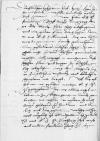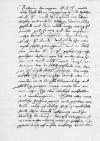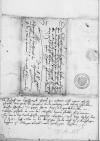Wir haben Ewer Furstlichen Durchlaucht freuntlichen ⌊⌋, datumm ⌊Konnigsperg⌋ den XV dits monts, / dysen thag entpfangennn / und mit guten fleis durchlessen, / dorinen uns Ewer Furstliche Durchlaucht erinnert, / das wir bisher was die gemeÿnnen lands gebrechennn, / muntz, / gesindlonnn, / buchsen schÿssen etc. anghett, / nicht habennn bÿsher geantwurtt, / weÿther auch antzeÿgt ir vornhemenn, / dass schÿssen, / furennn und tragen der buchssen / genzlich abtzuthun, / wÿ dann solchs, aus hochen furstlichenn vorstandt wol bedacht, ir schreÿbenn mit brengt. /
Uff das erst hab wir vor etzlichen monthen Ewer Furstlichen Durchlaucht zu geschrÿbennn, / das uns allein nicht wil bekwemen in solchen gemeÿnen lands gebrechen, / ane wÿssen der andern, / dÿ auch dartzu gehörennn, / zu handlenn, / und nemlich umb das gesindtlon, / welchs nicht wol muglich ÿst, allenthalbennn hÿ im lande, so wol Ewer Furstlichen Durchlaucht zugehorig, alse unss und andren stendennn, / gleich zu setzenn. /
Bÿttenn derwegen, Ewer Furstliche Durchlaucht wolde uns dyse kleine antzeÿgung zu gut halthen, / Ewer Furstliche Durchlaucht lande grentzennn mit ⌊Lÿtten⌋, ⌊Masow⌋ und andren orthern, / doraus solch gesinde und dinst volck nicht wenig zulaufft / und zu uns und den unsernnn nicht komenn mugennn, / dan durch Ewer Furstlichen Durchlaucht ⌊landt⌋, / und so dy her annn unser seÿthe gelangennn / und an demm lon, under Ewer Furstlichen Durchlaucht gesetzt, sich nicht genugen lassennn, / wer dÿ under uns haben wil und muss, / wirdt dartzu gedrungen, das er solch gesinde mit dem lon zu frÿde stelle. / Geschicht das nicht, / lawfen sÿ ins ⌊colmische landt⌋ ader ins werder umb ⌊Dantzke⌋, ⌊Marienburg⌋ und ⌊Elbing⌋ gelegen. / Wÿ mochte dan ein arm mhan hÿ sein arbeÿt vortstellen und vorbrengennn. / Solde aber was statlichs hirÿnne gesatzt und gehalten werdennn, / muss ess durch Ewer Furstliche Durchlaucht und alle ⌊stende dÿser lande⌋ uffgericht und in brauch komennn, / dartzu wir gerne, / so vÿl uns ummher muglich, wolten vorhelffenn. / Der gestaldt / auch uff unser einfeltig bedunckenn wer es vortzunhemenn mit dem schÿessennn, furen und tragennn der buchsen, / solthe dÿ Ewer Furstliche Durchlaucht alleine und wir neben der selbtenn in ⌊unsern landen⌋ vorbytten, / und unsere noch und beÿwonenden nachbarn uff allennn grenntzen freÿ haben, / dy mit Ewer Furstlichen Durchlaucht und unsern mandatenn nicht wollen getzungen sein, / mochte unsern landen und lewthennn etwan zu nachtheÿl, / ader aber zu eÿnner ferlicheÿt gereichenn. / So aber solchs in der ⌊Kronnn⌋ und allenthalb mit vorbottennn wurd, / haldt wirs dovor, / das ess fast gemeÿnnemm fried nutzlich wer. / Wir sein auch dem schÿssen und buchssen so zu gethan, das wir wolten, / das der keins uff erden wer etc.
Das wiltschiessen hab wir beÿ den unsern gentzlich abgethann, / halthen selbst auch kein schutzen, / wÿssen nymant, der sich under uns des schiessen gebraucht. / Wir haltens auch dovor, / das Ewer Furstliche Durchlaucht vil zu mÿlde wider dy unsern werde bericht. / Wir hören aber theglich, das solch schiessennn under Ewer Furstlichen Durchlaucht nicht wirt nachgelassennn, / dÿweÿl ein ÿder seÿnner freÿheÿtt gebrauchen wyl. / Wer aber fast gut, / das es gentzlich wurd abgethan, / domit das wÿldt widerumb / hÿ ins land gewonet. / Was uns derhalben Ewer Furstliche Durchlaucht zuvor ⌊⌋, / wirt eingelegte copeÿ weÿsenn etc. Domit aber Ewer Furstliche Durchlaucht spur, das uns dÿ II artickel der gemeÿnen lands gebrechennn / und das abbrengen des schiesssens hertzlichen sein, / und das wir gerne, / wÿ wir gewonet, / Ewer Furstlichen Durchlaucht wÿlferig wolten gefunden werden, / ist unser hochfreuntlich bytt, / und so vÿl unser einfaltt vormag, unser geringes und getrawes bedenckennn, / Ewer Furstliche Durchlaucht wolte diss alles, wÿ das dem gantzen lande ⌊Prewssen⌋ zu gutt auss hochem furstlichem vorstandt / wolgefunden und vorgenomen, / uff negster ⌊thagfart⌋ an ⌊konigliche rhethe⌋ zu ⌊Marienberg⌋ lassen gelangen, / domit eintrechtiglich von allen ⌊stenden⌋ zu solchen sachen geratenn, / auch gethan, / und darnach, was so beslossen, wirglich so wol von Ewer Furstlichen Durchlaucht, alse andrenn wurd vorgestaldt, / dartzu an uns kein fleis sol abghennn, / dan Ewer Furstliche Durchlaucht freuntlich zu dynen und in allem, das uns noch unserem stande muglich, / wolgefallen und wyllen zu thun, / auch gemeÿnnen nutz zu furderen, / sey wir volkomlich unvordrossen.




